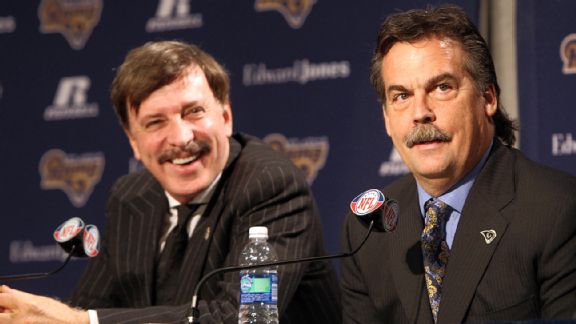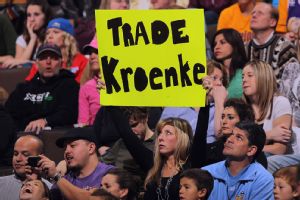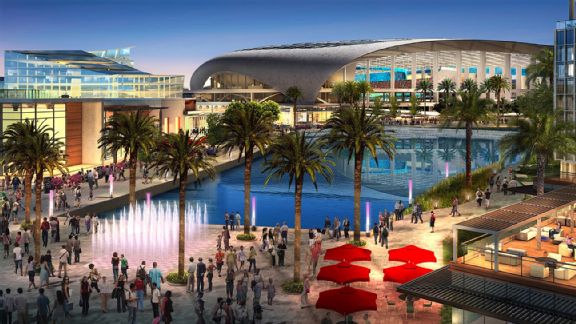http://m.espn.go.com/nfl/story?stor...op&rand=ref~{"ref":"https://www.google.com/"}
Kroenke sparks NFL chaos
THE FIRST PIECE of property Stan Kroenke ever cared about sits abandoned now, perched on the edge of an endless swath of farmland, sinking into the thick coffee-colored soil of central Missouri. Some of the original charm of Enos Stanley Kroenke's quaint childhood home in Mora (population: 424) remains intact. The green front door still features an old-fashioned brass and porcelain doorbell crank. The intricate wood detailing under the roof eaves has survived. But after years of neglect by the current owners, who converted the old water well into a TV antenna, any gust of wind can scatter giant flakes of gray house paint across the overgrown landscaping. "It was a beautiful little farmhouse at one time," whispers a neighbor. "It's not now."
Kroenke, the multibillionaire real estate developer and owner of the
St. Louis Rams, once recounted how he used to sit on the narrow front porch here and, as the summer sun set behind the corn, soak in the faint, scratchy radio broadcasts of the St. Louis Cardinals with his father and grandfather. Alvin Kroenke so loved the Cardinals that he named his eldest son after two of
the team's homegrown Hall of Famers: the hardworking Enos "Country" Slaughter and the quiet, humble effortless hitter Stan "the Man" Musial.
Today, though, the family's once idyllic front porch is full of gaping holes in its weather-worn floorboards. And Missourians fear that Kroenke's relationship with his native state
is falling into similar disrepair.
Since January, the reclusive Kroenke, 67, has been maneuvering his NFL team west, out of Missouri and into what would be the crown jewel of his massive real estate development and sports empire: a proposed 80,000-seat NFL stadium in Inglewood, California, with a space-age retractable roof, open-air sides and a U.S.-record $1.86 billion budget.
Five decades after he left Mora, Kroenke has amassed a net worth of $6.3 billion, according to Forbes, and through his array of vineyards, ranches and strip malls, many of them anchored by Wal-Mart, he has become the eighth-largest landowner in the United States. All the while, he has collected sports franchises like vintage cars. Besides the Rams, he owns the English Premier League team Arsenal, valued at $1.3 billion, the Denver Nuggets, the Colorado Avalanche, MLS's Colorado Rapids, the Colorado Mammoth of the National Lacrosse League and Denver's Pepsi Center, where he maintains a 12,000-square-foot penthouse apartment on the top two floors, complete with a theater, a gym and pristine views of the Rockies.
Most of these, however, would become secondary knickknacks if Kroenke is indeed the man who brings the NFL back to Los Angeles after a 20-year absence in the nation's second-largest media market. The move would immediately triple the value of the Rams (from an NFL-low $930 million in St. Louis, according to Forbes, to as much as $3 billion in LA) while making himself arguably the most powerful owner in sports. It could also transform the intensely private man, described by a family friend as "Midwestern, through and through," into both the Art Modell of Missouri and the king of La La Land.
How Kroenke pursues his LA dream, then, will not only shape his legacy but the entire landscape of the NFL. The league had seemed intent on carefully orchestrating its eventual grand return to LA while continuing to use the city as leverage in a handful of other stadium negotiations. Until, that is, Kroenke cranked up the heat with his extraordinary Hollywood-style power play -- one as intriguing and audacious as the enigmatic, mustachioed billionaire at the center of it all.
Kroenke hasn't spoken a word since the story of his relocation plans broke on Jan. 5, which is not the least bit surprising. The owner speaks publicly so infrequently that he's been dubbed Silent Stan in St. Louis, a moniker his PR rep disputed as unfair just before turning down The Magazine's interview request. When you ask NFL insiders about Kroenke, you hear a lot of descriptions like "eccentric" and "reclusive." While he is respected, and liked, in league circles, even those closest to the Rams' owner don't seem to know him very well. "What makes Stan Kroenke tick ... are you serious?" says a friend. "I have no earthly idea."
Right now, striking it rich in LA seems to be motivating a handful of other NFL power brokers too. On Feb. 19, the Raiders and Chargers, unhappy with their own stadium situations, announced a joint plan to build a $1.7 billion stadium on a 168-acre parcel in Carson, California. Entertainment giant AEG, which had an agreement with Los Angeles to build an NFL stadium next to the city's convention center, provided it could attract a franchise, also had its hat in the ring before dropping out on March 10.
Meanwhile, back in St. Louis, civic leaders have already countered with a $985 million stadium project, a deal they hope is rich enough to persuade, or force, Kroenke to stay home. Even so, most NFL insiders consider Kroenke the clear front-runner in the race to win the West. "The only thing that's moved the ball in LA has been Stan," Mark Fabiani, the Chargers' special counsel on stadium issues, told ESPN.com recently. "He changed the world."
So now, after 20 years of bluffs and empty promises in Los Angeles, the NFL's Hollywood soap opera suddenly has three teams and roughly $4.5 billion in new stadium proposals. It is sure to be the hot topic March 22-25 in Phoenix, where league owners convene for their annual meeting.
And all of it ignited by the most unlikely of leading men.
Gregg Segal for ESPN The MagazineNotoriously reclusive Kroenke and the Rams are now in the NFL spotlight after unveiling the scheme to move the team to L.A.
ABOUT 200 MILES west of St. Louis, out behind the old family farmhouse where the road transitions from concrete to dirt, stands the Mora Lumber Co., built and owned by Alvin Kroenke. Stan started working there at 10. Each day after Lutheran school he'd sweep floors and help with the books, quietly correcting the mistakes he found. By the time he was a tall, lanky teenager and standout athlete at nearby Cole Camp High, Kroenke was part of the work crew that met at 7 a.m. sharp on the Rock Island Railroad platform to unload hundreds of 1-by-12 planks of lumber and 94-pound sacks of cement. If the cars weren't cleared in 48 hours, the railroad company would assess a surcharge -- something the elder Kroenke simply would not abide. "That kind of work is not for the faint of heart," says Eldon Harms, 82, who worked alongside Stan and later bought the business when Alvin retired. (Both his parents are deceased.) "We had younger guys working with us who could always find something else to be doing besides lifting those bags of cement. But not Stan. Heck of a good kid. Whenever we got a break, Stan would be over behind the house, shooting baskets."
As a painfully shy, skinny 6-foot-2 senior forward with a high-rise black pompadour, Kroenke developed a fluid, vertical jumper, a quick trigger and, on the court at least, a little flair for the dramatic. On fast breaks during home games, teammates say, he liked to set up on the left wing just a few feet in front of Cole Camp's 200-student pep section. The team finished below .500 his senior year, but near the end of the season Kroenke heated up, notching a 22-point game followed by 33 points against Leeton, a school record that stood for more than a decade.
After he bought the Rams in 2010, Kroenke told a reporter in Columbia that once he realized he couldn't play for a professional sports team, he decided he wanted to own one instead. "Stan was very studious, very smart and not very outgoing -- I mean you can see that even today," says high school teammate and friend William Smart, who in his 46 years at Cole Camp has been both principal and athletic director. "If I'm being honest, there was never a time in high school when we all said, 'Oh that Stan Kroenke is going to be very, very successful one day.'"
KROENKE'S FORTUNES took off with a chance meeting while he was at the University of Missouri. In 1971, on a ski trip to Aspen, Colorado, he met Ann Walton, a nursing student at Mizzou and the daughter of Wal-Mart co-founder Bud Walton. "Kroenke made his money the old-fashioned way," says Scott Rosner, a sports business professor at the Wharton School who often lectures on Kroenke. "He married it."
Ann, who is worth $5.3 billion on her own, according to Forbes, is far less a mystery than her husband. "She is warm, friendly and so down-to-earth," says UTEP athletic director Bob Stull, a former Missouri football coach who was close with the couple in the 1990s. Attending an event at the Rams' practice facility, Ann once famously parked on the far side of the lot, telling a security guard that her daddy always taught her the spots up close were for customers. The couple married in 1974 and have two children, Whitney, 37, a documentary film producer in California, and Josh, 34, who played hoops at Missouri and is now vice president of the Nuggets. (Josh technically controls both the Nuggets and the Avalanche because of an NFL rule prohibiting certain cross-sports ownership.)
Rocky Widner/NBAE/Getty Images"Kroenke made his money the old-fashioned way. He married it," says Stan Rosner, a sports business professor at the Wharton School.
Just before marrying Ann, Kroenke earned his MBA and was awarded a paid fellowship to earn his Ph.D. But as gifted a student as he was, Kroenke knew his future was in strip malls rather than lecture halls. He left academia and went to work for Missouri real estate developer Raul Walters, who built some of Wal-Mart's first stores, making multimillion-dollar land deals often sealed with Sam Walton, Ann's uncle, on nothing more than a handshake. By 1979, Kroenke and Walters were partners in a company that had developed more than 20 retail malls across the Midwest. They implemented what would become Kroenke's basic, and wildly successful, business model: Buy huge parcels of relatively cheap land, build an anchor store, then watch the surrounding real estate exponentially increase in value.
It was a nice run, but Kroenke and Walters had a falling-out in 1985 and spent the next few years in a bitter court battle over how to divide the company's holdings. Coming off that unpleasantness, Kroenke forged a new partnership in 1991 with an old friend, Michael Staenberg, co-founding THF (To Have Fun) Realty, a nationwide real estate development company. Kroenke spent much of the next decade close to home in Columbia, where the voracious reader and health fanatic ran 3 to 6 miles most mornings with a group of men that included Stull, then Missouri's football coach. "He was focused, bright, no-nonsense and disciplined -- that's a good word to describe Stan: disciplined," says Stull. "Stan was not one of those guys who would be slogging along, joking around, just happy to finish. He was very, very competitive and always at the front at the end of our runs."
Kroenke, who looked to Bud and Sam Walton as early mentors, served on Wal-Mart's board of directors from 1995 to 2000. And over the next two decades, THF grew into a $2 billion company by developing more than 100 strip malls and shopping centers, many of them, again, anchored by Wal-Marts. But in early 2013, the buddies who initially just wanted To Have Fun were at each other's throats. They ended their partnership in St. Louis County Court. Along with a variety of disputes regarding the breakup of their company, the two multibillionaires fought
over items as relatively small as a $250,000 fitness center lease. Kroenke even accused Staenberg of locking him out of THF's computer system.
Doug Pensinger/Getty ImagesKroenke's dynasty started with a series of missteps as he tried to learn about the inner workings of the NFL.
By then, Kroenke was already scooping up every sports franchise he could get his hands on -- a quest, it's been suggested, rooted in a desire to prove that his empire wasn't built through matrimony alone.
His dynasty, however, started with a valuable lesson about the inner workings of the NFL. In 1993, when the league expanded, Kroenke was persuaded at the 11th hour to try to save the pitch of a potential ownership group in St. Louis. The unwieldy bunch, which included a host of local businessmen as well as Hall of Fame running back Walter Payton, was beset by big egos and infighting and in danger of falling apart. Just days before they were due to present the NFL with their plan, Kroenke was brought on to provide stability -- and money. "With Kroenke in the picture, St. Louis seems almost sure to get 21 of the 28 required votes from the club owners,"
The New York Times reported. But according to Jeff Pearlman's book
Sweetness, when the NFL heard the pitch, it was a disaster. Roger Goodell, then a league vice president, reacted by telling them, "Get this s--- together. This is ridiculous. You're there if you can cut the squabbling."
They couldn't. The owners were equally underwhelmed by Kroenke and his group. The teams were awarded to Charlotte and Jacksonville -- a city, as Pearlman notes, one-eighth the size of St. Louis and the 55th-largest television market.
It was a rare and embarrassing misstep that didn't sit well with the proud and hypercompetitive Kroenke. It was also another lesson in the dangers of finicky partners. "He made the presentation and the NFL kind of looked at Stan like, 'Who is this guy?'" says Stull. "Nobody knew him."
From then on, Kroenke would make sure they did.
Courtesy HKS In January, it was reported that Kroenke had plans to build an 80,000-seat stadium in Inglewood, California. The site would include a hotel, shops and residences.
IN 1995, KROENKE paid $80 million for 40 percent of the Rams when they moved from Los Angeles to St. Louis, with the guarantee that if the rest of the team ever went up for sale he'd have first dibs. In 2010, that opportunity arrived: He spent $450 million to purchase the remaining 60 percent of the team from the heirs of former longtime Rams owner Georgia Frontiere. "I'm born and raised in Missouri," Kroenke told the
St. Louis Post-Dispatch at the time. "I've been a Missourian for 60 years. People in our state know me. People know I can be trusted. People know
I am an honorable guy."
For Kroenke Sports Enterprises, though, success has always seemed less about connections to home or even W's and more about the dogged pursuit of profits extracted from, in real estate parlance, "the dirt" -- the land under everyone's feet. According to Rosner, the Wharton professor, Kroenke's level of immersion in sports ownership is unprecedented. It's not just horizontal, across several sports and continents, but vertical as well, from the billion-dollar stadiums down to the broadcasting rights and ticket fees. Rosner divides owners into two categories: "win maximizers" like Mark Cuban and Jerry Jones, who are in it largely for the ego kick, and "profit maximizers" like Kroenke, who are in it because sports teams turn huge profits. "Where would you rather be?" asks Rosner. "St. Louis, where the market for your sport has historically been average, or LA, where the valuation of your business would skyrocket to $3 billion, easy? You go to LA. You'd be a fool not to."
Rather than relying on the NFL to micromanage the LA market or, worse, anoint a beneficiary the owners deem worthy, Kroenke has forced the league's hand and triggered a land rush. On Jan. 5, the
Los Angeles Times first reported that Kroenke, who already owned 60 acres near the Forum in Inglewood (purchased from Wal-Mart in 2014), had teamed with Stockbridge Capital Group to build an 80,000-seat NFL stadium as part of an enormous complex on the 300-acre Hollywood Park site. The deal made Kroenke the first and only NFL owner of an existing team to own land in LA. He's had his eye on this spot since as early as 2012, when potential Rams employees were asked about a franchise move during interviews. Later in January, he got even more aggressive, converting his stadium lease in St. Louis to a year-to-year deal, which means the Rams could be free to leave town as early as 2016. "He's got the land and he's got the money," says one NFL exec. "Stan's guns are loaded."
Kroenke's expansive plan for the site, which includes retail, residential, office and hotel space as well as a 6,000-seat theater, perfectly aligns with his well-honed business model: For his anchor tenant, he has simply replaced the Wal-Mart with an NFL stadium. It's also precisely the kind of splashy statement the NFL has always had in mind for its return to Los Angeles. What's more, Kroenke's vow to privately finance the project garnered tremendous support in cash-strapped Inglewood, where on Feb. 24 the city council voted unanimously to approve the $1.86 billion stadium. Inglewood Mayor James T. Butts Jr. called it "the best financial arrangement in the history of stadium deals in this country." After a 5-0 vote that let Kroenke bypass what could have been a lengthy environmental review at the site, football fans dressed in the team's blue and gold colors chanted "LA Rams! LA Rams!"

Erik M. Lunsford/St. Louis Post-Dispatch/ MCT /LANDOVKroenke has stayed out of the media, minus a rare appearance in 2012 when he hired coach Jeff Fisher.
Right now, the biggest obstacle to making that happen isn't Oakland or San Diego but, of all places, St. Louis. Initially, Kroenke and the city had been $575 million apart on the renovation plan for the Edward Jones Dome. Since then, St. Louis has come back with a new proposal for a state-of-the-art, open-air stadium in the city's blighted north riverfront section that includes $400 million in public financing. The plan has a lot of potential pitfalls, the least of which is getting Kroenke to the table now that he has one foot in the California sand. But there is growing sentiment inside the league that after a year of gaffes by the NFL front office, the last thing it can afford to do is alienate more fans while leaving a pile of stadium money on the table. "Goodell won't let Stan move to LA," one NFL owner told ESPN. "Because Goodell would catch holy hell for moving a team from a market willing to spend hundreds of millions to keep a team."
It's not clear at this point what role, if any, NFL approval will play in Los Angeles. Dallas owner Jerry Jones has already said that Kroenke doesn't need the NFL's permission to move the Rams. It's an opinion backed by federal antitrust laws and argued in court by Al Davis, who moved his Raiders franchise to LA in 1982 and then back to Oakland 13 years later. Kroenke could follow that lead. It would be an ugly, drawn-out public spectacle, and the Rams would be a lame-duck franchise for years. But in the past, and with far less at stake, Kroenke has never shied
away from a fight in court. For the time being, Kroenke's camp is saying he won't go against the NFL's wishes.
Just in case he changes his mind, Steelers president Art Rooney II, speaking in February for the NFL's new de facto Committee on Los Angeles Opportunities, reminded Kroenke that NFL bylaws still state that all franchise relocations require the approval of a super-majority (24 of 32 owners). This is the much easier route, and the process of lobbying for those votes will begin in earnest on March 22. Among all their fellow owners, Kroenke, Chargers president Dean Spanos and Raiders owner Mark Davis will be working the room in Phoenix, gauging votes and gathering input and support for their own relocation plan while simultaneously working to sabotage their competitors. In other words, it's the kind of weekend retreat Frank Underwood would love.
At first glance, the Chargers would seem to have the upper hand. The Spanos family has owned the franchise for 30 years and has managed to build up a lot of influence (and sympathy) inside the league while trying for 14 years to get a new stadium built in San Diego. What's more, schmoozing and glad-handing don't exactly seem to be Kroenke's forte.
He need not worry, though. In NFL circles, that extra comma in Kroenke's net worth, as well as his daring leap to secure LA and a global sports empire, speaks volumes. "He might be Silent Stan," says a former NFL executive. "But Kroenke's kind of power and profile makes the other owners swoon."
If Kroenke succeeds, it would be the perfect Hollywood ending for the quiet kid from Mora. He'd have marquee franchises in London and Los Angeles, a legacy far beyond Wal-Mart, billions in profits and, finally, recognition as the most powerful man in sports.
All without having to utter a single word.





